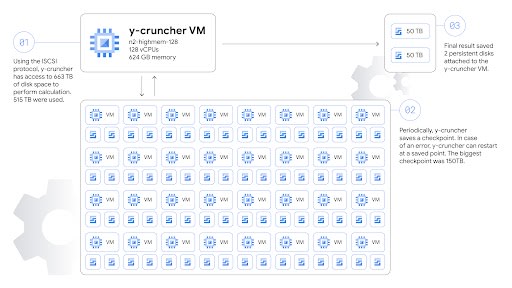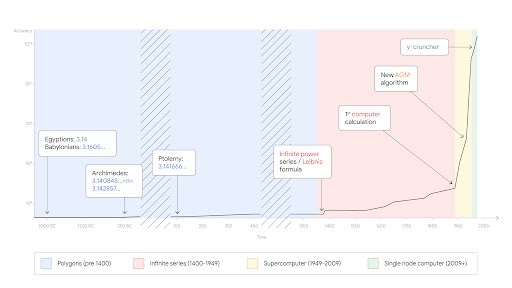- | 8:30 am
A Google Cloud employee set a new record calculating the 100 trillionth digit of pi
Emma Haruka Iwao has seen further than any previous human into the never-ending number.

A Google employee has given us greater insights into the mathematical mystery that is pi (also known to many of us as 3.14).
Using the company’s cloud computing services, Google Cloud developer advocate Emma Haruka Iwao was able to calculate the first 100 trillion digits of the mathematical constant, making her the first person ever to know the 100 trillionth digit (it’s a zero). Google is now working with Guinness World Records to officially verify her accomplishment.
It’s the second time Iwao has set such a milestone—she calculated 31.4 trillion digits in 2019, the record at the time—though she’s been interested in the number for much of her life. “Pi has been my personal passion since my childhood,” she says, recalling using a program called Super PI as a preteen to calculate roughly a million digits of the number.

Pi, which is the ratio of any circle’s circumference to its diameter, can’t be expressed precisely as a fraction or decimal, so it’s possible to calculate an arbitrary number of decimal digits of its representation. Calculating ever-longer sequences of pi has long been a challenge for amateur and professional mathematicians and computer scientists.
Iwao says the dramatic leap forward since 2019 comes as a result of increased capabilities in Google’s Compute Engine service, including speedier processors, faster data storage, and increased network capabilities to sync the hardware doing the computation.
“That kind of progress I hope makes people excited about Cloud and sort of encourages them to use Cloud for their own programs,” Iwao says.
Google is also releasing a demo that anyone can use to calculate a smaller number of digits of pi on its cloud systems; the code used to do the computing is available on GitHub.

Google isn’t disclosing the cost of the computation, which took 157 days to run across 128 virtual processors using 864 gigabytes of memory. In total, the program crunched through 82,000 terabytes of data, which Google says is the same amount of storage as 2,598 years’ worth of HD movies. Iwao did the calculation using a freely available program called y-cruncher and worked with its creator, Alexander J. Yee, to verify that the result is correct.
To ensure the number is, indeed, correct, Iwao also used an algorithm that makes it possible to generate specific digits of pi without knowing all the previous ones, letting her verify that some of the final digits are correct, which implies the previous ones almost certainly are. She also compared the initial digits to those found by others’ previous calculations.
The exact digits Iwao computed will also be available—on the cloud, naturally—so that anyone can download all 100 trillion digits or use an application programming interface to access specific digits. While scientists and engineers don’t typically need 100 trillion digits of pi for precise calculations, Iwao says people are interested in the distribution of different digits in the number.
Iwao hopes that the project will also make people aware of cloud computing’s power for scientific computation in general. And she imagines that as the technology continues to improve, it won’t be the last time she pushes pi computation forward—perhaps by a significant amount.
“Technically, even if you can add one digit, it’s a new world record,” Iwao says. “I think this is more [interesting] when we can show significant progress.”





































